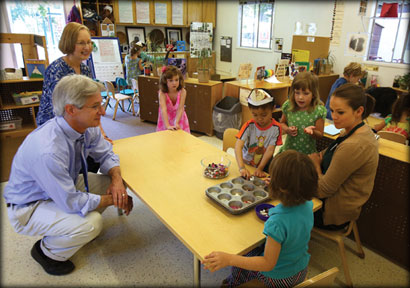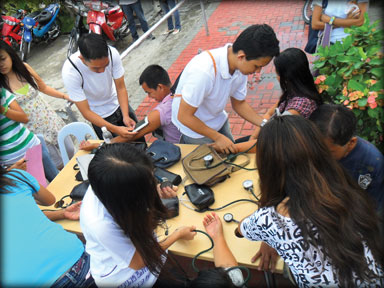The magic of selfless giving
By Lionel Wijesiri
We make a living by
what we get. We make a life by what we give.
-
Winston
Churchill
 |
|
Sharing with children
will give you immense joy |
In modern society, everyone wants to earn the same three things -
money, a name and the ability to make a difference. Our actions are
dictated by the one we want most. You can make a name for yourself -
become famous - or you can make a lot of money in complete obscurity.
Either way, people will consider you a success. However, famous
people with piles of money always seem to be haunted by the need to make
a difference.
Bob Buford, Director of the internationally well-known Peter Drucker
Institute says, “The first one-third of the adult life is a quest for
money, the second one-third is a quest for name and the third one-third
is for significance.” Success is measured by the money and the name
you’ve made. Significance is measured by the difference you’ve made to
the outside world.
So the good news is that making a difference doesn’t always require
money and it certainly doesn’t require a name. Significance is achieved
by caring and giving without expecting anything in return.
There is an old saying “It is better to give than to receive.” This
old saying has roots in many religions. The Buddha said, “Before giving,
the mind of the giver is happy; while giving, the mind of the giver is
made peaceful; and having given, the mind of the giver is uplifted.”
Jesus Christ said, “It is more blessed to give than to receive.”
Prophet Mohamed quoted Allah’s message, “O you who believe! Spend out
of what we have given you.” Accordingly, every wealthy adult Muslim must
give 2.5 percent of his or her wealth in charity every year.
In Hinduism, the third Niyama (observance) out of 10, the practices
that every ideal Hindu should follow - is giving or charity (Dana). It
says, “Be generous to a fault, giving liberally without thought of
reward.”
Experiments
In addition to these religious backgrounds, scientists are looking
for biological evidence for why it’s better to give than to receive. For
example, some scientists believe that giving to or helping others helps
relieve stress in the body and is therefore beneficial to your health.
 |
|
Volunteer health camps
is another way of selfless giving |
For example, research by social psychologist Liz Dunn of the Royal
Society of Chemistry and her colleagues, appearing in the journal
Science, shows that people’s sense of happiness is greater when they
spend relatively more on others than on themselves. In one survey of
over 600 citizens, Dunn and colleagues found that spending money on
others predicted greater happiness whereas spending money on oneself did
not, and this pattern was found across all income levels. In other
words, even those with little money reported greater happiness when
their proportion of spending on others, relative to the self, was
greater.
In a more controlled experiment, Dunn and colleagues gave students at
the University of British Columbia an envelope containing money and told
them that they either (1) had to spend the money on themselves before
5.00 pm that day or (2) had to spend the money on someone else before
5.00 pm. Those who gifted for others were happier than those who gifted
for themselves.
In some cases, there were five dollars in the envelope and in other
cases there were 20 dollars.
The amount didn’t matter - the results were the same. Spending on
others made people happier than spending on oneself. Ironically, when
asked to predict which outcome would make one happier (i.e., spending on
oneself or spending on others), another group of students at the same
university thought spending on themselves would make them happier than
spending on others. In short, people’s selfish assumptions were proven
wrong when they actually had the opportunity to give to others than to
oneself.
Another study in March 2008, conducted by Michael Norton, Professor
at Harvard Business School, also supported the proverb, making it clear
that giving is better than receiving. “Most people would think that if
you make more money, you are going to be a lot happier,” said Norton.
“Our results, and a lot of other people’s results, show that making
more money makes you a little bit happier, but doesn’t really have a
huge impact on you. Our studies suggest maybe that little changes in how
you spend it make a difference.”
The researchers’ work is published in Science. Norton and his
colleagues questioned 632 Americans about how much they earned and how
they spent their cash. They also asked them to rate their own happiness.
Regardless of income level, those people who spent money on others
reported greater happiness, while those who spent more on themselves did
not.
Looking back
Take a moment and think about the times, as a child or adult, when
you felt most happy, joyful, or at peace. Were those moments really
defined by how much money someone spent on you? Or was it the time and
attention you received or the intimacy and connection you experienced
that made you feel exuberant? The wiser we become in the ways of the
heart, the more we realise that the biggest and most expensive gifts
aren’t necessarily the best ones. Better than bigger is the gift of the
heart.
 |
|
Give yourself entirely
to those around you. Be generous with your blessings |
Years ago, I visited a friend for a weekend stay. On the second day,
I was seated in his backyard reading the newspaper when Geethani, the
five-year old from next door peeked through the fence and greeted me.
After we had exchanged some pleasantries, she suddenly asked me,
“What’s your favourite colour?” “Well, it’s yellow,” I replied. In an
instant, she was off, disappearing around the side of her house and
calling behind her shoulder, “Stay right there, stay right there!”
When she returned, she came bearing a gift. “Here’s a flower from our
garden,” she said, “a yellow flower.” With a smile big enough for both
of us, she stretched her arm towards me. She was carefully holding
between her fingers a large yellow rose.
It’s been long years since Geethani presented me with her flowers and
I’m sure she’s forgotten all about it. But I’ll never forget her gift -
and the smile that leapt from her heart and landed softly in the middle
of mine.
Geethani may not have known what the beloved classic of India, the
Bhagavad Gita, has taught for millennia: “One who offers to me with
devotion only a leaf, a flower, a fruit, or even a little water, this I
accept, because it was offered with love by one who is pure-hearted. BG
9.26
It’s not just what you give, but how you give that counts. It’s not
the size of the gift, but the size of your heart. By giving out what you
have without expecting anything in return, you start living a meaningful
life. You get to realise your true calling in a life full of challenges.
That is the magic of selfless giving. |

